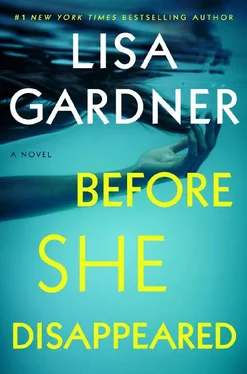Livia’s nails were chewed down to the nub, Lotham had said. A clear sign of stress.
I continue my study, and within minutes, I know what I need to know. There are plenty of other places to dump a body in this city. Dumpsters, back alleyways, abandoned buildings. But this placement: beautiful, serene, private.
The kind of person who would bring Livia’s body here is the kind of someone who cared.
Livia’s mysterious older brother? Or perhaps her other brother, drug-dealing J.J.? What about Angelique herself? Had she been forced to participate in this atrocity? Again, control 101. Establish fear and intimidation through death and destruction of the people your subject cares about most.
The pieces of this case swirl around me. Two girls with promising futures. At least one scam involving fake IDs. Coupled with a second scam involving a scenic university in Western Mass. Except what did that mean? Because both Livia and Angelique were pictured at the college, yet I didn’t believe for a minute they’d run away to join some college under fake names.
I stand on the pathway. I can hear birds chirping, feel a soft breeze on my face. It is peaceful. It is beautiful.
I gaze down again where a girl’s body was abandoned just last night. Livia Samdi deserved so much better. She deserved being found alive. She deserved growing up, discovering her own unique self. She deserved a life.
I feel now, more than ever, the weight of my own failure.
So many missing persons cases. And yet none I’ve brought home alive.
“I’m sorry,” I whisper to Livia Samdi. Then I stand quietly and just be. Weigh the magnitude of my regrets. Resolve to do better, because that’s the best any of us can do.
Then, ten, fifteen, twenty minutes later, I head back down the path, keeping away from the police, to the entrance of the park. Ten a.m. I already know where I’m headed next. Hopefully Frédéric will now be at work at the rec center.
Only one way to find out.
* * *
I have to walk all the way around the rec center building again. It’s very quiet here, and with the outdoor fields and courts, it reminds me of the hushed beauty of Franklin Park. Is that significant? My mood has gone dark. Even with the sun on my face, I’m thinking of dead girls, and personal failures and memories that won’t help me now.
Focus. I round the giant metal structure, finding the back doors unlocked and stepping gratefully inside. Once more the space is hushed and quiet. Lights out in the long corridor with pools of deeper dark marking the abutting classrooms and gym area. Such a huge space. Filled with plenty of nooks and crannies for Marjolie to sneak off with her boyfriend DommyJ. Not to mention shadowy corners perfect for drug exchanges, fake ID sales, and . . . ?
I have that tremor again. I don’t know what’s wrong with me. Starting my day with a handsome man who asks too many personal questions? Visiting a crime scene? I’m a mess of nerves. I don’t like this building anymore. In its own way, it’s also a crime scene. Where Angelique stood up to a bully with the help of her new friend. Where Livia Samdi thought her life was finally looking up. Where some summer programming happened to be going on in the background, but that had nothing on the real drama taking place among the teen participants. If these walls could talk . . .
I find my way to Frédéric’s office on my first try. In my jumpy state, I’m walking softly, as if I don’t want the ghosts of teenagers past to find me. As a result, when I rap lightly on the partially opened door, Frédéric startles, knocks a pile of papers off his desk, and whacks his computer monitor.
“Sorry.” Not the most auspicious start to a conversation.
“How did you get in here?” he asks sharply.
“The back door was open.”
“Mmm.” He seems to collect himself. “I try to keep it locked when I’m alone in the building.”
So I’m not the only one spooked by all this empty, lurking space.
“I just had a few more questions,” I start.
Frédéric nods, bending down to collect his fallen papers. “You are looking for Angelique Badeau,” he says, in his beautiful French-laced English. “I remember. Any word from the girl?”
“No. But after my conversation with you, we were able to connect Angelique with Livia Samdi. They were friends.”
He nods, straightening his long, lean form, but the statement doesn’t seem to mean much to him.
“Livia Samdi also disappeared. Eight months ago. This morning, the police found her body in Franklin Park.”
Now Frédéric swallows hard. It’s difficult to read his face. Stoic, resigned. As a man who works with at-risk kids in an inner-city neighborhood, he’s probably had this conversation before. Does it make it easier to take?
“I am very sorry,” he says at last. Then, more tentatively . . . “Overdose?”
“She was murdered.” I deliver the words bluntly, and am rewarded by a ripple of emotion across his smooth dark features. Then he subsides once more to stoic acceptance.
“You believe Livia’s death and Angelique’s disappearance are related? That is why you have returned?”
“Yes.”
“Why?”
“They met here. Became friends here. During the summer program.”
Frédéric offers a shrug. “Are you sure they met here? Many of our kids already know each other. This neighborhood isn’t that big.”
“They met here. What can you tell me about DommyJ?”
The abrupt change in topic catches him off guard the second time. His face goes flat. Instinctive defense mechanism. As in he knows plenty about DommyJ, and is already mentally sorting out what he should and should not reveal. Question is, because he needs to protect himself and the program, or because he’s afraid of DommyJ?
“What do you want to know?” he asks at last. Excellent strategy. When in doubt, answer a question with a question.
“I hear he deals in fake licenses.”
“The subject came to our attention,” Frédéric allows at last, steepling his fingers in front of him. “There was an incident, toward the end of the program. Angelique was involved. She was angry with DommyJ for selling an ID to her friend. But not that he shouldn’t have coerced her friend into doing something illegal. Rather, the quality of the forgery was so poor, he should be ashamed of himself. She claimed he owed her friend a refund. Naturally, Dommy disagreed. I walked out in time to break up the altercation and order the three teens to my office. Upon further questioning, however, all parties involved denied there was a problem. You know how it is. My staff and I kept an eye out, but we never saw any more signs of trouble. Then the program was over, and the kids moved on.”
“Do a lot of your charges buy fake IDs?”
“I have no idea.”
“Come on. You work with teenagers. Surely you must have some sense of the demand?”
“Not really. The amount of illegal goods and services these kids can already get on any street corner, from drugs to guns to phones . . . This whole area is a black-market economy. You don’t need valid ID for those kinds of transactions.”
He raises a good point. Marjolie had wanted her ID to keep up with her club-hopping boyfriend. So there were some things the local dealer couldn’t supply. But apparently, not much.
“What would’ve happened if you’d caught DommyJ selling fake IDs?”
“We would’ve kicked him out of the program. Zero-tolerance policy, remember?”
“Like you did with Livia Samdi’s older brother?”
“J.J. Samdi? Yes, there were issues. He was banned from the rec center after a volunteer caught him selling drugs. The police were informed, though I don’t know what became of the matter. We do not hold the sins of the brother against the sister, however. Livia Samdi remained welcome.”
Читать дальше












